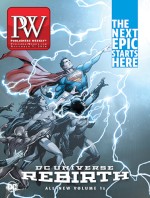Interest in Islam at American and European universities has picked up since 9/11, and the past few years have seen a flood of Islamic studies books from academic publishers. “It does feel like a thousand flowers are blooming,” says Richard Brown, director of Georgetown University Press. A Jesuit institution with strengths in public and foreign policy, the university has worked with the Church of England for more than 10 years to host Christian-Muslim dialogues. The press adapts conference proceedings into books of essays; the most recent is Sin, Forgiveness, and Reconciliation: Christian and Muslim Perspectives (Apr. 2017), edited by Lucinda Mosher of Hartford Theological Seminary and David Marshall of Duke Divinity School. “We’re trying to represent the best of Islamic scholarship and Christian scholarship,” Brown says. “We publish these books and get them out to an audience beyond the academy.”
Oxford University Press keeps churning out titles, adding to a list that is both deep and broad. “Lately, I have been seeing a lot of proposals on Islamic thought, which is great because it hits the intersection of philosophy and religious studies, two areas in which OUP excels,” says Theo Calderara, editor-in-chief, history and religion. “I’d love to see more proposals that are similarly interdisciplinary.” The social sciences will also provide helpful lenses for Islamic studies; Calderara cites The Making of a Salafi Muslim Woman (out now), by English independent scholar Anabel Inge, which looks at lived religion among Muslim women.
The University of North Carolina Press’s Islamic Civilizations and Muslim Networks series adds When Sun Meets Moon: Gender, Eros, and Ecstasy in Urdu Poetry by Scott Kugle (June 2017), who teaches South Asian and Islamic studies at Emory University. An examination of nontraditional gender roles and how they relate to artistic expression, the book includes Kugle’s translations of previously untranslated Urdu poetry. “Our books try to look deep within the varieties of Islamic life and expression,” says Elaine Maisner, senior executive editor of the press.
Beauty in Sufism: The Teachings of Ruzbihan Baqli by Kazuyo Murata (SUNY, Dec.), who teaches Islamic studies at Kings College London, analyzes the place of beauty in the Sufi understanding of God, the world, and the human being. Christopher Ahn, senior acquisitions editor for Asian studies and religious studies at the press, says he’s seen growing scholarly interest in Sufism over the past decade. “Many scholars are attempting to resist the narrow and highly politicized notion of Islam that has taken hold in the public imagination, at least in the West,” Ahn says, “and scholarly interest in mysticism and esotericism in general seems to be on the rise.”
To date, Islamic studies has not played a visible role on the list of Fortress Press, the publishing arm of the Evangelical Lutheran Church in America. But the denominational publisher takes seriously its charge to provide resources for Lutheran Christians to understand their neighbors and in that regard has plans for a few Islamic studies titles. “We’re trying to produce resources that provide perspectival accounts of religions that are deeply contextual, that approach our neighbors’ faith from their perspective,” says Mike Gibson, acquisitions editor in theology. The press has just revised and expanded Islam: What Non-Muslims Should Know (out now) by religion professor John Kaltner.
“I see more proposals about Islam and Muslims and Muslim identity written by Muslims and about Muslims than I have ever before,” says Carey Newman, director of Baylor University Press. He calls the growth of the field “generative” and is particularly interested in proposals on Islamic law and Islam in America, especially with reference to American traditions of freedom of speech and religion. Muslims and the Making of America by Amir Hussain (out now), who teaches theological studies at Loyola Marymount University in Los Angeles, was years in the making. “Islamic studies are going to become interesting to all sorts of people,” Newman adds. “It’s going to be a livelihood no less so than the study of Judaism and Christianity.”



 Volume 263
Issue 45
11/07/2016
Volume 263
Issue 45
11/07/2016





